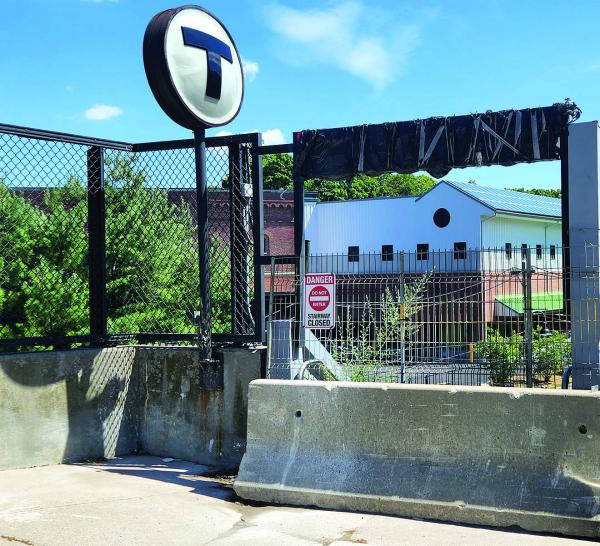October 12, 2022

The Milton station on the Mattapan trolley line will be part of the overhaul of the high-speed system. The stairs have been closed for three years. (Gintautas Dumcius photo)
The MBTA has scheduled an online meeting next Tuesday (Oct. 18) at 6:30 p.m. – the first since last April, when the agency sought feedback on its plans for its Mattapan Line – to provide an update on the future of the trolleys that roll through Dorchester, Mattapan, and Milton.
Officials are expected to discuss the refurbishment of the aging vehicles as well as its plans to overhaul and upgrade the system, which began operating in 1929 and runs from Ashmont Station through Milton and on to Mattapan Square.
The agenda also includes a report on the stairs at the Milton Station in Lower Mills, which have been closed for three years. Milton town officials are suing the MBTA over the extended closure.
The transformation of the Mattapan trolley line runs on two tracks: There is the behind-schedule refurbishment aimed, at a cost of $12.2 million, at getting another decade of service out of the current trolleys, which are more than 75 years old.
Then there is the larger overhaul of the entire line, which includes modernizing the stations and power infrastructure, along with installing new at-grade crossings. That project, budgeted at $114.5 million, also involves station upgrades that will bring them into line with Americans with Disabilities Act (ADA) regulations. The agency has hired HNTB, an engineering firm, to handle the project’s design.
The biggest change in the modernization of the trolley line would eventually lead to the MBTA deploying “Type 9” trolleys, in use now on the Green Line, on the Mattapan Line. Other proposals that the MBTA opted against involved continuing the constant repairs of the old trolleys, or putting in an electric bus fleet.
At the April meeting, MBTA project manager AJ Tanner said there will be “wholesale changes” to Mattapan Station, the line’s terminus, and the reorganization of the yard to accommodate the new Green Line-type trolleys. “You’ll also see wholesale upgrades to every station along the line,” he said, noting that several concept designs will be available for each station.
The delays to the project have frustrated residents who depend on the trolleys. “There were assumptions that it was due to Covid, but even after the beginning of the pandemic, there were portions of time where no work was done,” said Dorchester state Rep. Dan Hunt. “It’s a complete mismanagement of that process.”
State Rep. Russell Holmes, who attended the April meeting, said he is looking forward to learning the timeline for the upgrades. He said he had stressed to MBTA officials that they stay in communication with residents and others interested in the project. Eventually shifting to the deployment of Green Line trolleys is a “good solution,” he said.
Holmes also floated the idea of expanding the trolley line up Blue Hill Avenue, which before cars took over the space, once accommodated trolleys taking riders into Roxbury. City officials and residents are now debating whether to put a center lane dedicated to a bus along the avenue.
But if the Mattapan trolley line overhaul is done the right way over the next 10 to 15 years, Holmes said, it could lead to something better than a busway. “We have to have a bigger vision,” he said. “People want light rail more than they want the bus.” But, he added, officials have to build trust before any talk about an extension. “You have to develop that trust in the neighborhood because it doesn’t exist,” he said.
The Boston Planning and Development Agency recently released a draft plan for the Mattapan area with zoning changes to make it more of a “10-minute neighborhood” that also touched on the trolley line. The BPDA’s plan mentioned extending the line to “Readville and beyond,” with planners noting that “the MBTA should evaluate opportunities and feasibility of extending the Mattapan Line along excess Fairmount Line right-of-way.’
Jarred Johnson, executive director of the advocacy group Transit Matters, said they’re “excited” the city is taking a closer look at the Mattapan Line and “its potential to serve even more riders once the line is modernized.”
The transformation project can’t be complete until next generation of Green Line cars arrives to replace the current ones, according to Johnson. “The T needs to have the capacity to manage this significant project while it simultaneously works on a lot of other projects,” he added.
Hunt said his priority is “safe, reliable, frequent service on existing lines and bus routes.” “I’m not in favor of expansion in a time where they’re cutting services,” he said, referring to the trimming driven by safety concerns raised by federal transit authorities.


